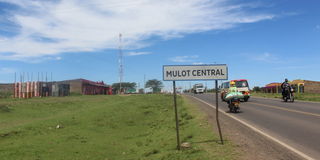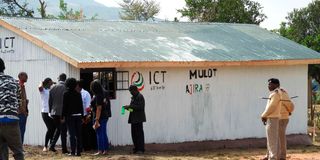Premium
From criminals to IT experts: Inside plan to reinvent Mulot

A busy tarmac road leading to notorious cybercrime hotspot Mulot Central in Bomet County in April 2021.
What you need to know:
- The Bomet County Government has secured 52 acres in Mulot Sunset for the ICT hub.
- Most Mulot cybercrime suspects are primary and secondary school dropouts.
- Governor Hillary Barchok said his administration was working with the State to turn the region’s fortunes around.
The government has announced plans to establish an information and communication technology (ICT) hub in Mulot as part of efforts to shed the region’s reputation as East Africa’s cybercrime headquarters.
The devolved administration has secured land for the project to build Kenya’s first rural-based hub of its kind. The multibillion-shilling initiative will be implemented by the Kenyan government in collaboration with global ICT companies. This follows President William Ruto’s directive to the county government to secure land for the ICT hub.

A section of shops at Mulot Central trading centre which has the highest concentration of mobile phone money transfer fraudsters.
“We want to ensure that the youths in Mulot put their talents to good use instead of engaging in cybercrime,” Dr Ruto said in Bomet town recently.
Illegal activities
For years, Mulot has been notorious for mobile money fraud, with trading centres such as Mulot Central, Mulot Olomirani, and Mulot Sunset becoming hotspots for illegal activities.
The Bomet County Government has secured 52 acres in Mulot Sunset for the ICT hub, said Stella Rotich, the chief officer in charge of ICT in the county.
“Setting up a software development factory will transform Mulot from a cybercrime hub to a centre of innovation and coding training for the youth. It will be a game-changer in the country,” Ms Rotich told the Nation.
She added that, in the interim, an ICT hub will be established on a 4.5-acre plot initially identified for the project, with tendering for the project expected to start in the 2024/2025 financial year.
Governor Hillary Barchok said his administration was working with the State to turn the region’s fortunes around.
“We have succeeded in securing the land and are looking forward to the allocation of funds for construction of the software factory,” Professor Barchok said.
The centre will also train the youth on e-commerce, said Bomet East MP Richard Yegon, adding:“It is important that we rid the area of crime. The software factory will expand Mulot into a major trading centre and create employment for locals.”
SIM swap criminals
The Directorate of Criminal Investigations (DCI) has been tracking down SIM swap criminals.
County police boss Robinson Ndiwa told the Nation that the crackdown was starting to bear fruits following the arrest of several suspects.
“The problem we are faced with is the failure by the victims to come forward and prosecute the cases, forcing the courts to release them,” Mr Ndiwa said. In the past six months, more than 25 suspects have been arrested.
A Bomet court recently released five mobile money fraudsters who were arrested with exercise books filled with names of the targeted victims alongside their mobile phone numbers, SIM card pins, M-Pesa balances, Fuliza limits, Kenya Commercial Bank (KCB) account details and KCB M-Pesa loan limits.

The main road leading into Mulot, Bomet County on November 2, 2022.
The books had records of names and dates of births of the SIM card holders, their home origins among other crucial details.
Police had also recovered 14 unused SIM cards, nine Safaricom used SIM cards and 11 national identity cards suspected to have been stolen.
The case collapsed after Safaricom and Airtel refused to cooperate with the investigators, according to State prosecutor Clara Boyon, with the Resident Magistrate Mbethi Michuki allowing the prosecution to close the file.
Following the police operation, a majority of the fraudsters have now relocated to Nakuru, Uasin Gishu, Kiambu, Kajiado, Baringo and Nairobi counties.
Impending raids
The police have in the past been accused of colluding with the criminals by tipping them off about impending raids, thereby facilitating their escape.

The makeshift Mulot ICT hub when it opened on July 29, 2022 with the government expected to construct a multi-billion software development centre in the area.
On May 17, 2024, a police officer was arrested in Kericho in a case where a doctor was conned of Sh1.5 million. Constable Richard Kipkoech Kirinyet who was based at Cheptalal Police Station in Konoin Sub-county in Bomet County was accused of receiving Sh489,788 through his mobile phone with the SIM card registered in his name, being part of the Sh1,521,633 fraudulently transferred to from the KCB account of a Nairobi-based doctor.
Interestingly, most Mulot cybercrime suspects are primary and secondary school dropouts.
They are suspected to work in cahoots with employees from mobile phone companies and banking institutions, some of whom have been sacked over integrity issues.





